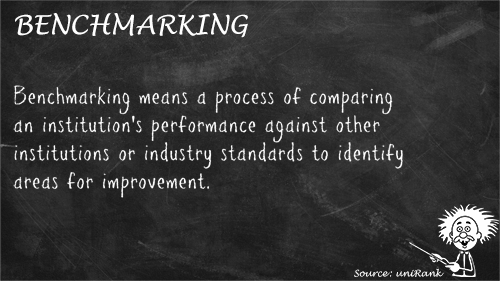
Benchmarking
What does the academic term Benchmarking mean in higher education?
Benchmarking

Short Definition
Benchmarking means a process of comparing an institution's performance against other institutions or industry standards to identify areas for improvement.
In-depth Overview
Benchmarking
Long definition: Benchmarking in higher education is a strategic management tool used by universities and colleges to evaluate their performance, processes and outcomes by comparing them to those of peer institutions or established industry standards. This process helps institutions identify strengths, weaknesses and areas for improvement, allowing them to set goals, prioritize initiatives and enhance their overall effectiveness. Benchmarking can encompass various aspects, including academic programs, student services, administrative functions and financial operations. It is essential for institutions seeking to remain competitive, improve quality and adapt to changing educational landscapes.
Etymology: The term "benchmarking" is derived from the concept of a "benchmark", which originally referred to a mark or point of reference carved into stone or other materials to serve as a standard for measurement. In a modern context, benchmarking involves using recognized standards or best practices as reference points for evaluating performance.
Synonyms or related academic terms:- Performance comparison
- Best practice analysis
- Peer institution assessment
- The university conducted benchmarking with its peer institutions to assess the efficiency of its research funding allocation.
- As part of their strategic planning process, colleges often engage in benchmarking to identify areas where they can excel.
- Spanish: Benchmarking
- French: Étalonnage
- German: Benchmarking
- Italian: Benchmarking
- Portuguese: Benchmarking
- Japanese: ベンチマーキング (Benchimākingu)
- Chinese (Simplified): 基准评估 (Jīzhǔ pínggū)
- Hindi: बेंचमार्किंग (Beṅcamārkiṅg)
Visitors interested in exploring how benchmarking is applied in higher education or how institutions use it to improve their performance can use the uniRank World Universities Search Engine to access relevant information and case studies.
Wikipedia Article
unirank Glossary Classification
Miscellaneous higher education terms > University academic terms
Share Glossary Term
Interesting? Share this University Glossary term with your friends now.